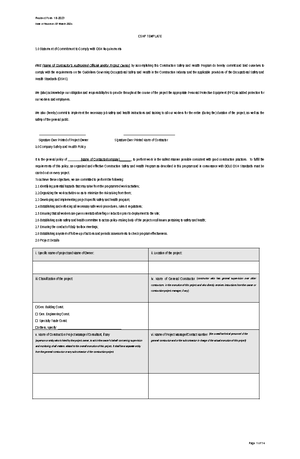- Information
- AI Chat
Was this document helpful?
Draft- Polgov - Politics
Course: Politics, Governance, and Citizenship (GEED 20023)
93 Documents
Students shared 93 documents in this course
University: Polytechnic University of the Philippines
Was this document helpful?

Module 1: Exercise 1
1. What does politics have to do with conflict and cooperation?
2. Discuss briefly and distinguish from each other the basic concepts of politics.
3. How do political philosophy and political science as approaches in studying politics
differ?
4. Discuss briefly the importance of Governance
Answer:
1. The politics is about the cooperation and conflict. Which conflict is produced by the
differences of individuals. As they have different perspective on things and as they
disagree to the element of life. However, the cooperation is being motivated by men’s as
their common objective to live a good life. as the men may dispute and fight, this was an
evident that they would want to live in peace. The politics is a way of processing on how
to resolve disagreements of humans in order for them to achieve and preserve the order. It
is the resolution to every conflicts.
2. The expression “political concepts” refers to a set of concepts essential to any serious
reflection on political life. This set includes order, power and justice.
Order reflects to the various components of the human societies and it is essential to the
study of politics. It also has various forms of societal institutions it is the Community,
Government, and State.
- Community – It is a group of person with common identity in one type of social
order. The primary reason for its existence is to protect individuals. The economic
success, cultural enrichment, and other societal purposes are all derivatives of the
same thing.
- Government – Is the higher level of the social order it existed essentially to ensure
the community’s survival. If it can successfully assert its claim to rule, it is
considered to have "sovereignty." It is also said to be "legitimate" if its claim to
power (rule) is willingly acknowledged.
- State – It is the world's largest social system, from which the term politics is derived.
It refers to a group of people who are more or less numerous, permanently occupying
a certain area of land, have their own administration to which the majority of the
population submits, and are free from external authority.
Power the exercise of power and the resulting establishment of structures are responsible
for their origin and perpetuation. The general rule is that the more abundant the power
source, the larger the government's possibilities. In a more limited definition, power
denotes "control over" rather than "capacity to" do something.
Justice the proper application of power results in justice. There is justice if, in the use of
its power and authority, the government provides what the people require, protects and
respects their rights, and prioritizes the common good over the leaders' personal
interests. It is important to note that law, whether written or unwritten, is the embodiment
of order and power in modern times. As a result, law is defined as the approximation of
justice. Justice is the foundation of the law.














